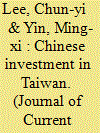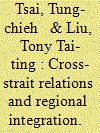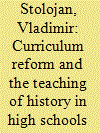|
|
|
Sort Order |
|
|
|
Items / Page
|
|
|
|
|
|
|
| Srl | Item |
| 1 |
ID:
154233


|
|
|
|
|
| Summary/Abstract |
This study looks at the sources of anti-Japanese sentiment in today’s China. Using original survey data collected in June 2014 from 1,458 students at three elite universities in Beijing, we quantitatively investigate which factors are associated with stronger anti-Japanese sentiment among elite university students. In particular, we examine the link between the Chinese Communist Party (CCP)’s nationalist propaganda (especially patriotic education) and university students’ anti-Japanese sentiment. We find that nationalist propaganda does indeed have a significant effect on negative sentiment towards Japan. Reliance on state-sanctioned textbooks for information about Japan, visiting museums and memorials or watching television programmes and movies relating to the War of Resistance against Japan are all associated with higher levels of anti-Japanese sentiment. The findings suggest the effectiveness of nationalist propaganda in promoting anti-Japanese sentiment. We also find that alternative sources of information, especially personal contact with Japan, can mitigate anti-Japanese sentiment. Thus, visiting Japan and knowing Japanese people in person can potentially offset some of the influences of nationalist propaganda.
|
|
|
|
|
|
|
|
|
|
|
|
|
|
|
|
| 2 |
ID:
154229


|
|
|
|
|
| Summary/Abstract |
Cross-Strait economic activities are no longer unidirectional. The Taiwanese government opened the doors to Chinese investment in 2009. This paper addresses the following crucial question: What is the impact of Chinese investment on Taiwan’s high-technology industrial development? Two further questions immediately follow: Will Chinese investment put Taiwanese industrial development at risk? Will an influx of Chinese investment lead to a turning point for Taiwanese industry? The paper first reviews Chinese investment in Taiwan under the framework of the Economic Cooperation Framework Agreement (ECFA) and then explains why we have chosen to focus here on the high-technology industry in Taiwan. It then outlines the main elements of Chinese outward foreign direct investment (OFDI) before seeking to answer the above research questions. Fieldwork for this paper was conducted from December 2014 to March 2016. Interviewees include Chinese investors, along with consultants from a Taiwanese institute created to promote industrial development.
|
|
|
|
|
|
|
|
|
|
|
|
|
|
|
|
| 3 |
ID:
154228


|
|
|
|
|
| Summary/Abstract |
Despite the signing of the Economic Cooperation Framework Agreement (ECFA) between mainland China and Taiwan in 2010, Taiwan’s future status in the field of Asian regional integration remains unclear. While Taiwan remains outside the Trans-Pacific Partnership (TPP) and the Regional Comprehensive Economic Partnership (RCEP), China’s rise and continued expansion in regional integration put increasing pressure on Taiwan to confront its political differences with China. This paper discusses the interconnection between regional integration and cross-Strait relations and seeks to address the implications such linkage entails. The authors note the exploitation of a two-pronged strategy by Beijing to pressure Taibei into confronting the political problem between China and Taiwan. In addition, the authors assess Taiwan’s performance in terms of its progress in the establishment of preferential trade agreements (PTAs) from 2008 to 2016 under the Ma Ying-jeou (Ma Yingjiu) administration and identify the hurdles and prospects for Taiwan’s future integration efforts. This paper concludes with a brief consideration of Taiwan’s New Southward Policy.
|
|
|
|
|
|
|
|
|
|
|
|
|
|
|
|
| 4 |
ID:
154231


|
|
|
|
|
| Summary/Abstract |
The last two years of Ma Ying-jeou’s (Ma Yingjiu) presidency saw the eruption of a controversy surrounding proposed revisions to the high school history curriculum. Although not the first time that the subject of history has exacerbated the tensions between holders of a China-centred view of Taiwan’s history and those favouring a more Taiwan-centred approach, this crisis, which took place mainly between 2014 and 2015, was undoubtedly the fiercest witnessed by the Taiwanese society in the sphere of educational issues. By putting the 2014–2015 dispute into perspective through a review of the different attempts made by the pro-Taiwan independence Chen Shui-bian (Chen Shuibian) and the pro-unification Ma Ying-jeou governments to edit the history curriculum, this article will underline the specificities of this particular controversy. This contribution will, therefore, help to shed new light not only on the perception of Taiwan’s history promoted by the Ma administration, but also the policy-making process which characterised the last years of Ma’s presidency.
|
|
|
|
|
|
|
|
|
|
|
|
|
|
|
|
| 5 |
ID:
154234


|
|
|
|
|
| Summary/Abstract |
This study assesses the quality of Chinese outbound FDI data. In our case study of the Netherlands, we checked the data quality of the often-used Orbis/Amadeus database and its data source, the Dutch Chamber of Commerce (Kamer van Koophandel, KVK), which has one of the oldest and, arguably, one of the better databases within Europe. We analysed Chinese investments in the Netherlands and show that six adjustments are necessary to clean up the data. We also show that not making these adjustments can significantly impact the outcome of research. The cleaned-up data show that sampled Chinese firms are young, small, and private.
|
|
|
|
|
|
|
|
|
|
|
|
|
|
|
|
| 6 |
ID:
154230


|
|
|
|
|
| Summary/Abstract |
Employing the spiral model, this research analyses how anti-human trafficking legislation was promulgated during the Ma Ying-jeou (Ma Yingjiu) presidency. This research found that the government of Taiwan was just as accountable for the violation of migrants’ human rights as the exploitive placement agencies and abusive employers. This research argues that, given its reliance on the United States for political and security support, Taiwan has made great efforts to improve its human rights records and meet US standards for protecting human rights. The reform was a result of multilevel inputs, including US pressure and collaboration between transnational and domestic advocacy groups. A major contribution of this research is to challenge the belief that human rights protection is intrinsic to democracy. In the same light, this research also cautions against Tai-wan’s subscription to US norms since the reform was achieved at the cost of stereotyping trafficking victimhood, legitimising state surveillance, and further marginalising sex workers.
|
|
|
|
|
|
|
|
|
|
|
|
|
|
|
|
| 7 |
ID:
154227


|
|
|
|
|
| Summary/Abstract |
Given the events of recent months, it seems that world affairs might
very well be on the verge of entering a new stage. While this observation
may not be very original, it is still of profound significance to the
Asia-Pacific region: with respect to the new US administration that
just took office, many observers are wondering about the possible
consequences for US foreign policy in Asia and other parts of the
world. The future progress of the Trans-Pacific Partnership (TPP)
appears precarious in light of President Donald Trump’s publicly
stated reservations about this projected agreement, and it remains to
be seen whether the United States will move away from the “Return
to the Asia-Pacific” strategy (later labelled as “pivoting” or “rebalancing”
to the Asia-Pacific) that had been pursued by former US president
Barack Obama since 2009. These uncertainties are particularly
troublesome for established US allies in the region, amongst them
Taiwan, which has long relied on US support in its delicate political
dealings vis-à-vis an ever-rising Chinese mainland.
|
|
|
|
|
|
|
|
|
|
|
|
|
|
|
|
| 8 |
ID:
154232


|
|
|
|
|
| Summary/Abstract |
The political strategies used to attract Taiwanese Millennials is a puzzling topic. This article analyses the strategies the two main political parties have implemented in recent years to do so. In the literature on youth attitudes in Western democracies, politics is described as “boring,” a “big turn-off,” and a “killjoy.” I examine to what degree these theoretical terms can help define the youth’s perception of politics and I describe the youth-led demonstrations that have taken place. Using primary sources, this analysis unfolds the objectives, successes, and failures of the youth wings of two political parties founded in early 2006. The 2008 and 2012 presidential campaigns are considered in relation to the theme of youth engagement. A key event in recent years was the March–April 2014 Sunflower Student Movement. The impact of this event and youth politics leading up to the 2016 presidential and legislative elections is discussed.
|
|
|
|
|
|
|
|
|
|
|
|
|
|
|
|
|
|
|
|
|